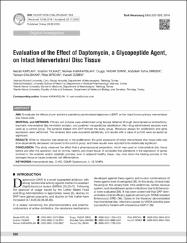Evaluation of the effect of daptomycin, a glycopeptide agent, on intact intervertebral disc tissue

Göster/
Erişim
info:eu-repo/semantics/openAccessTarih
2019Yazar
Kaplan, NecatiYılmaz, İbrahim
Karaaslan, Numan
Yaşar Şirin, Duygu
Şimşek, Abdullah Talha
Çalışkan, Tezcan
Bircan, Rıfat
Özbek, Hanefi
Üst veri
Tüm öğe kaydını gösterKünye
Kaplan, N., Yılmaz, İ., Karaaslan, N., Yaşar Şirin, D., Şimşek, A. T., Çalışkan, T. ... Özbek, H. (2019). Evaluation of the effect of daptomycin, a glycopeptide agent, on intact intervertebral disc tissue. Turkish Neurosurgical, 29(4), 522-529. https://doi.org/10.5137/1019-5149.JTN.24447-18.3Özet
AIM: To evaluate the effects of pre- and intra-operatively administered daptomycin (DAP) on the intact human primary intervertebral disc tissue cells. MATERIAL and METHODS: Primary cell cultures were established using tissues obtained through decompressive laminectomy, traumatic intervertebral disc herniation excision, and posterior transpedicular stabilization. Non-drug-administered samples were used as a control group. The samples treated with DAP formed the study group. Molecular assays for proliferation and gene expression were performed. The obtained data were evaluated statistically, and results with a value of p<0.05 were accepted as significant. RESULTS: While no reduction was observed in the proliferation, the gene expression of intact intervertebral disc tissue cells was time-dependently decreased compared to the control group, and these results were reported to be statistically significant. CONCLUSION: This study observed the effect that a pharmaceutical preparation, which was used on intervertebral disc tissue before and after the operation, had on normal, healthy, and intact tissue. It concludes that alterations in the expression of genes involved in the anabolic and/or catabolic process, even in adjacent healthy tissue, may slow down the healing process of the damaged tissue or cause undesired cell differentiation.

















